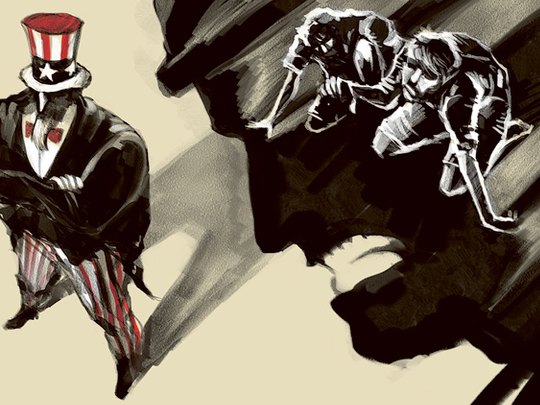
The scene opens with two masked men kneeling over what looks like a rice sack, one man holding it down, the other man repeatedly raising his right fist and pounding it. The fisted man stands up, giving us a clearer view, and begins stomping on the figure. Then it moves and we see a head and a small body writhe in pain: The rice sack is a person. Long after the figure goes limp, the men continue the assault.
The unmoving rice sack was my cousin, 15-year-old Palestinian American Tareq Abu Khudair from Tampa, Florida. The two masked men were Israeli police officers.
Videos and pictures of Tareq hit international mainstream and social media within hours — perhaps because he is tied to the brutal revenge kidnapping and murder of his cousin, 16-year-old Mohammad Abu Khudair, or perhaps because he is an American. Tareq’s family members, who live in communities across the US and in occupied Jerusalem, were lucky: Calls from journalists (about what high school he goes to and what his hobbies are) helped get him released from an Israeli jail and sent to a hospital. The problem is that Tareq is not alone. This week’s violent attacks on two teenaged boys, and an entire occupied Jerusalem village, are not outliers. This is how Israeli security forces work, both inside and outside the Occupied Palestinian Territory.
State-sanctioned Israeli brutality towards local Palestinian populations is a regular occurrence in Israel and the West Bank. As a result of the disappearance of three Israeli teens hitchhiking in the West Bank (they were later murdered), Israel’s response was to kill six Palestinians, arrest some 700, invade 1,600 homes, schools and businesses and bomb more than 30 sites. (Since Monday, Israeli airstrikes in Gaza have killed at least 75 Palestinians.) Though the Israeli authorities, with security coordination from the Palestinian National Authority, had rampaged through the West Bank in search of suspects, rhetoric still oozed from Israeli government statements and calls for revenge flooded social media. These calls for unencumbered violence sent a clear message to the colonists and other Israelis who called for “Death to the Arabs” that lynch mobs targeting Palestinians were and are acceptable. Message received: One group kidnapped a teenaged Palestinian boy, beat him to within an inch of death and then set his body on fire.
Behind a mask
If you drive through Palestinian neighbourhoods of occupied Jerusalem today, Arabic graffiti covers the walls warning against Israeli attacks: “Beware of child kidnappers”. “Hide your children”. From family reports, many of the individuals sent to the hospital or arrested as a result of funeral processions for Mohammad were under the age of 18. And now there is the video of Tareq’s 15-year-old limp body being dragged away by grown men, hiding their faces behind a mask for (one can only hope) shame of being identified.
Is one child’s life more valuable in the eyes of humanity than another’s? According to the statistics and the silence of the international community (including and especially the US), the ongoing and systematic attacks, night raids and arbitrary arrest of Palestinian children indicate the answer is yes. Defence for Children International-Palestine, a children’s rights organisation that documents and reports human rights violations against children worldwide, has documented the killing of more than 1,400 Palestinian children by Israeli soldiers and colonists since 2000. This translates into the killing of one Palestinian child at the hands of Israelis every three days for the past 13 years. In addition, there are 214 children in Israeli detention, 32 of whom are between 12 and 15. Human rights groups estimate that in the past five years, some 2,500 Palestinian children have been detained by Israel, some as young as five years old.
Imagine sending your son or daughter to the corner store, only to have him or her hunted by violent fundamentalists, systematically attacking a local ethnic population. This is Trayvon Martin (the African-American teen shot dead in 2012 by a guard in a gated community), en masse.
Israeli children are not subject to night raids by masked men with automatic weapons, nor are they required to always carry documents attesting to their identity and residency. There is no such thing as separate but equal schools, neighbourhoods or roads — they are inherently separate and unequal. The Palestinian child’s reality is a gruesome one punctuated by constant control by arbitrary Israeli directives and the whims of teen-age soldiers just out of high school themselves.
Palestinian children are simply that — children — and are the only children in the world required to ensure the security of their occupier. The US government, the provider of more than $3 billion (Dh11 billion) in military aid to Israel every year, should be more assertive in standing up for the rights of these children.
— Washington Post
Tamara Essayyad is a Palestinian-American attorney and policy commentator based in Washington, D.C.









